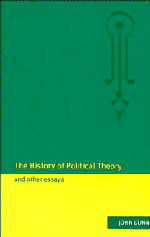Book contents
- Frontmatter
- Contents
- Preface
- Acknowledgements
- 1 Introduction
- 2 The History of Political Theory
- 3 Contractualism
- 4 Political obligation
- 5 Trust
- 6 The claim to freedom of conscience: freedom of speech, freedom of thought, freedom of worship?
- 7 Property justice and common good after socialism
- 8 The dilemma of humanitarian intervention: the executive power of the Law of Nature, after God
- 9 Specifying and understanding racism
- 10 Political science, political theory and policy making in an interdependent world
- 11 Democracy: the politics of making, defending and exemplifying community: Europe 1992
- 12 Is there a contemporary crisis of the nation state?
- 13 Political and economic obstacles to rapid collective learning
- 14 The heritage and future of the European left
- Index
11 - Democracy: the politics of making, defending and exemplifying community: Europe 1992
Published online by Cambridge University Press: 05 February 2010
- Frontmatter
- Contents
- Preface
- Acknowledgements
- 1 Introduction
- 2 The History of Political Theory
- 3 Contractualism
- 4 Political obligation
- 5 Trust
- 6 The claim to freedom of conscience: freedom of speech, freedom of thought, freedom of worship?
- 7 Property justice and common good after socialism
- 8 The dilemma of humanitarian intervention: the executive power of the Law of Nature, after God
- 9 Specifying and understanding racism
- 10 Political science, political theory and policy making in an interdependent world
- 11 Democracy: the politics of making, defending and exemplifying community: Europe 1992
- 12 Is there a contemporary crisis of the nation state?
- 13 Political and economic obstacles to rapid collective learning
- 14 The heritage and future of the European left
- Index
Summary
No thoughtful person today could suppose that democracy is a term with a single clear meaning. But in contrast with other prominent items in the lexicon of modern political values - justice, equality, liberty, obligation, right - it has at least had a single and relatively determinate history, and one which is not radically at the mercy of translational discretion across languages or mutual cultural opacity. To write a history of the ideas of justice, equality, liberty or obligation is not merely to undertake a task which would tax the resources of the most imaginative, learned and incisive of possible scholars. It is also to treat as a determinate cognitive assignment a venture which possesses no plausible historical determinacy even in the first instance (Dunn 1968). But with democracy, for all the haziness of reference and the mental indolence or purposeful bad faith with which the term has often been deployed, the position is in the end quite different. Here, we do confront a single historical sequence: one which certainly has a clear beginning, and which, for all its proliferating subsequent variety, ought in principle to be intelligible as a historically natural outcome, across time and space, of that singularly concrete and distinctive commencement (Dunn 1992).
There are two different respects in which democracy stands out in this way from the swirling and irritable confusion of modern political discourse. The first is by the crisp idiosyncrasy of its origin; the second by its recent (and for the present remarkably comprehensive) triumph in a single relatively definite institutional format - the modern constitutional representative democratic republic (Fontana 1994).
- Type
- Chapter
- Information
- The History of Political Theory and Other Essays , pp. 178 - 195Publisher: Cambridge University PressPrint publication year: 1995
- 1
- Cited by



